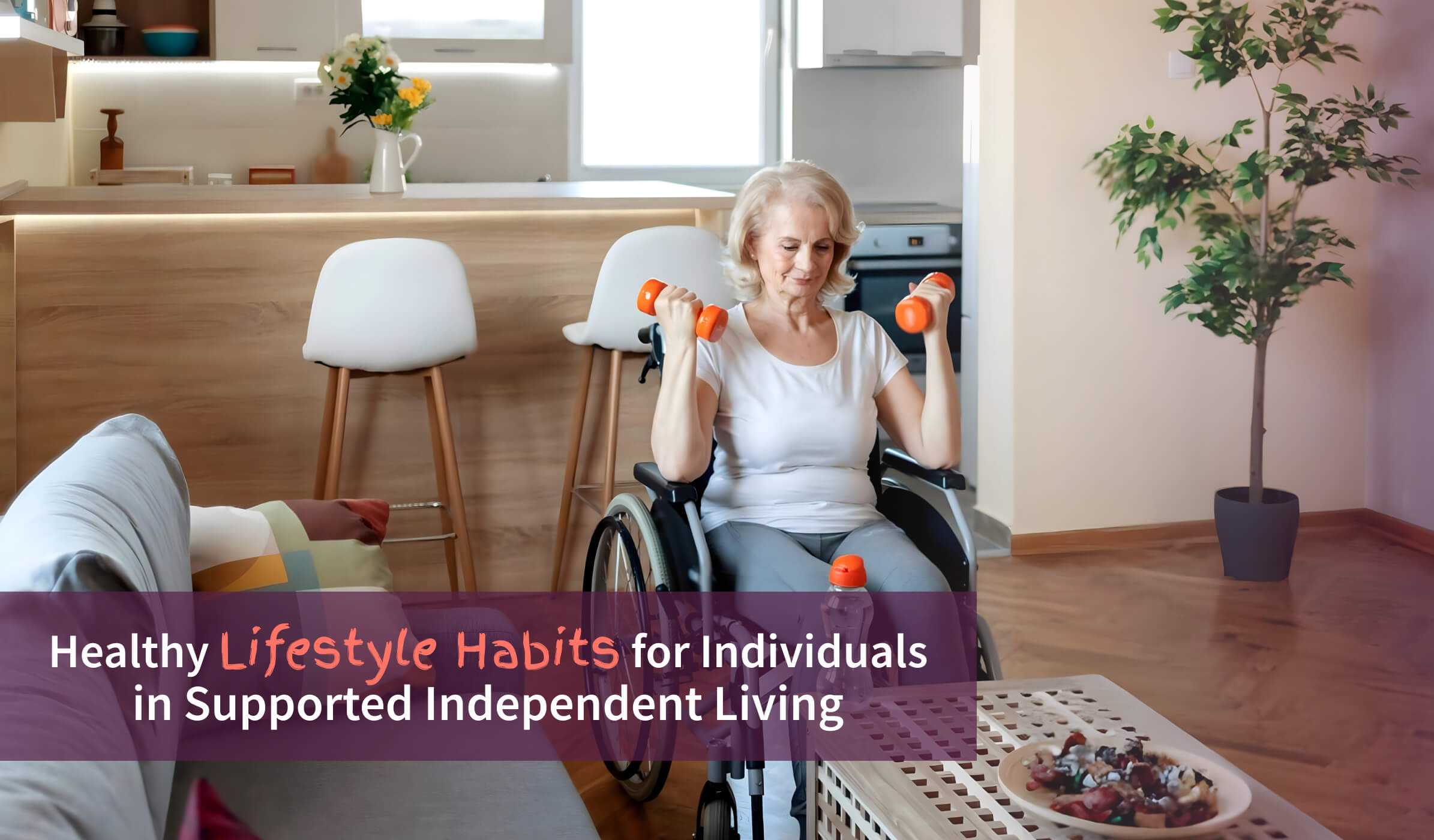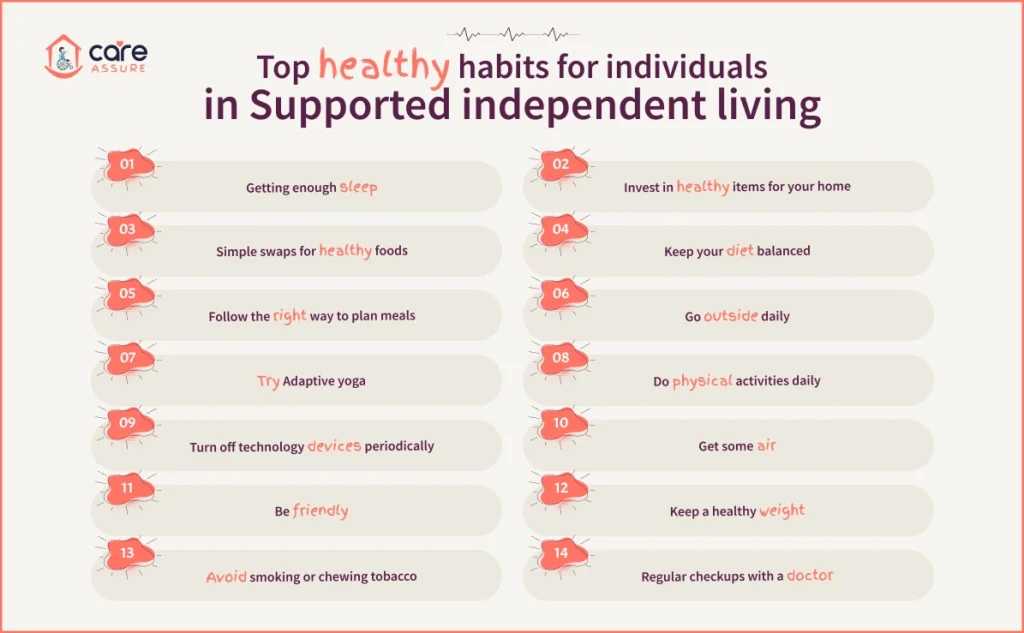Healthy Lifestyle Habits for Individuals in Supported Independent Living
May 28, 2024
|By Careassure
|14 min read

People with disabilities are no different from anyone else; every day, they make decisions that can affect their health and safety. If you want to feel your best, especially if you have a disability, you should stick to good habits. A big difference in your general health and happiness can come from doing simple things like working out daily, eating healthy foods, getting enough sleep, and doing something you enjoy. Getting into these healthy habits can help you deal with your disability better and lower your risk of getting sick. You can improve your health from head to toe with these simple tips.
Top healthy habits for individuals in Supported independent living

1. Getting enough sleep
The most important thing is to get enough sleep and do it regularly. A link between sleep and life expectancy has been found, but it's easy to miss because people focus on food and exercise. Some people find it strange that the connection is shaped like a U. So, not getting enough sleep and too much sleep can harm your health. One study found that people who slept for a long time (more than 10 hours a night) were more likely to have mental diseases and a higher body mass index (BMI). Another study found that people who slept nine or more hours a night were 23% more likely to have a stroke than people who slept seven to eight hours a night. If someone slept more than nine hours and then napped for 90 minutes or more, they were 85% more likely to have a stroke.2. Invest in healthy items for your home
The place where you live has a bigger effect on your health than you think. Things like a messy home can cause worry and tension. And if you are disabled, having too much stuff can be very dangerous. Clear out your home and only keep the things that are useful to you. After getting rid of a lot of stuff, you might want to buy some good health items to make your home healthier. For instance, you could turn an empty spot into a home gym with workout equipment that is easy for people with disabilities to use. You might also want to buy some kitchen tools to make cooking easy. This might make you want to make healthier meals at home! Read in-depth reviews from reliable sources before you buy things for your family.3. Simple swaps for healthy foods
Folks with disabilities are more likely to get health problems from bad food choices, which is a shame. On the other hand, living well can make your life a lot better! Simple changes to the daily foods are the best way to get more nutrients. Instead of soda and fruit juice, try drinking water. Instead of chips, eat popcorn. And instead of mayo, eat protein-rich hummus.Living a healthy life is all you need to do to improve your quality of life. Making healthy food swaps, putting sleep hygiene first, following professional goals, and spending money on good health products can all help people with disabilities in many ways. Do some of these things right away to improve your daily life!
4. Keep your diet balanced
You can't say enough good things about a healthy diet. People with disabilities need to eat a healthy diet of proteins, vitamins, minerals, and fibre. For example, eating foods high in nutrients is important for general health because it boosts the immune system and ensures the body works at its best.Also, drinking enough water keeps you hydrated, which helps your stomach and keeps your skin healthy. So, disabled people should try to drink at least 8 cups of water daily, and if they're doing physical tasks, they should drink even more. Lastly, practise mindful eating by focusing on your hunger cues and savouring your meals without other thoughts. This can help you have a better relationship with food and stop you from eating too much.
5. Follow the right way to plan meals
For disabled people, planning meals can mean eating healthy foods or choosing less healthy options. People planning their meals can get help from carers or family members to make a weekly menu with various foods. For example, people can try to eat a mix of fruits, vegetables, whole grains, and lean proteins. Also, eating foods high in nutrients can help you stay healthy and full of energy. Hence, having a good meal plan can help track caloric intake and keep it within healthy ranges, promoting a healthy weight.6. Go outside daily
Walking once a day can make you feel better and get your body moving. With the peace of nature, this simple healthy living action might help you feel better. It's easy to take a moment to stretch your legs or enjoy the fresh air on your face. A short walk outside can help you feel better and ready for the rest of the day.7. Try Adaptive yoga
Yoga is a relaxing and healing activity that can help your mind and body feel calm. People with a wide range of physical and mental skills can benefit from practising deep breathing, getting stronger, and improving their balance. Adaptive yoga is great because it can be changed to fit the needs of people with trouble moving around.8. Do physical activities daily
For our health and happiness in retirement, it's very important to make habits that keep us physically busy. Being fit helps us get the most out of our retirement and lets us keep doing the things that make us happy for longer. The Australian Institute of Health and Welfare says that adults aged 65 and up should do at least 30 minutes of moderate physical activity most or all days of the week. They should also be as active as possible when sitting still or using a screen for long periods, and they should try to include muscle-strengthening activities in their exercise and daily lives whenever possible.Working out might sound like a pain, especially if you're just starting to think about being active. But if you find something you love, it will be the best part of your day, and you can always try something new.
9. Turn off technology devices periodically
As our world becomes more digital, it's easy to become attached to technology, whether we're using our phones to check the weather, tablets to finish sudoku or TVs to watch the latest episode of our favourite show. Much proof shows how important it is to take a break from technology. Making this a habit is a great way to focus on other parts of our lives.Researchers have found that spending too much time in front of a screen can hurt our physical and mental health in several ways. For example, it can make it harder to sleep, raise our risk of obesity and heart disease, and make people of all ages feel more stressed and anxious. In short, spending less time in front of a computer is better. Enjoy your time. We all have a lot of things we want to do and try, so plan something you've been meaning to do when you'd normally be on your phone. You could meet up with a friend, work in the yard, or walk while listening to a new audiobook.
10. Get some air
Getting fresh air is great for our health; it can help with stress and anxiety, boost our immune systems, and give us more energy. Spending time outside daily is an easy habit to form and keep up with. Gardening is fun outside, and moving in the garden can be just as good for you as aerobic and strength-building activities. A study by the American Society for Horticultural Science found that older people can meet their daily physical exercise goal by gardening for just 30 minutes a day.If you live near the coast, the beach is a great place to get some fresh air, whether walking, swimming, or just watching the waves. Being so calm at the beach isn't by chance. Researchers have found that negative ions in sea air raise serotonin levels, which makes you feel better and lowers your worry.
11. Be friendly
Nobody is too old or too young to need good ties in their lives. The quality of our lives is better when we have relationships with family and friends. They give us a sense of security and reduce feelings of loneliness and separation. It's important to make it a habit to stay in touch with people to feel like we still belong when we retire. Our ties at work and with family may change as we adjust to a new way of life.You could volunteer to meet new people and help your community. You could also join a community group or the men's shed near you to exercise, meet new people, and improve your mental health.
12. Keep a healthy weight
Being overweight makes you live less long and makes you more likely to get many diseases. The good news is that being overweight doesn't make you live less long. For people over 65, it's better to be above normal than below normal.Body mass index (BMI) and death rates over 24 years were looked at in a study published in 2018.10 People with a BMI between 19 and 24 are thought to be "normal" or healthy. People whose BMI was between 30 and 35 were considered obese and had a 27% higher risk of death. A 93% rise was linked to a BMI of 35 to 40. People with a BMI between 25 and 30 were considered overweight. Those who smoked were the only ones more likely to die. People with a BMI that was just above average (like a BMI of 24) were least likely to die.
13. Avoid smoking or chewing tobacco
About 480,000 people die every year in the United States alone because they smoke. On top of that, 16 million more people are still living but dealing with a disease caused by smoking. Don't smoke or chew tobacco if you want to live a long and healthy life.It's linked to a lot of different illnesses and cancers. For those having a hard time quitting and believing that getting sick takes a lot of time, it might help to set more short-term goals. It might be too expensive, or smoking bans inside might keep you from going to social events.
Or maybe the worries about middle age will help! Skin wrinkles more quickly when you smoke. Men who smoke may also have trouble getting or keeping an erection. Giving up tobacco or not using it at all will not only save lives but also keep it safe.
14. Regular checkups with a doctor
Along with using adaptive tools, it is important to get regular checkups with your doctor. They must monitor a person's health, nutrition, and exercise level. People with disabilities can get useful information from these checkups and, if needed, change their diet, nutrition, and exercise habits. So, family members or carers of people with disabilities must ensure they get checked regularly by making the right visits.Conclusion
Even though people with disabilities may face special problems, it's important to stress how important it is to eat well and be physically active regularly for their general health and wellness. They are very important for better quality of life and long-term physical health. So, follow these tips on what to eat and how to exercise to live a good life. Challenges will come up along the way, but people with disabilities can get through them with the right help and attitude and live long, happy, healthy lives.
Frequently Asked Questions (FAQs)
A healthy lifestyle encompasses various facets, including nutrition, physical activity, mental well-being, and social engagement. Prioritise balanced nutrition, regular exercise, adequate sleep, stress management techniques, and maintaining connections with others.




